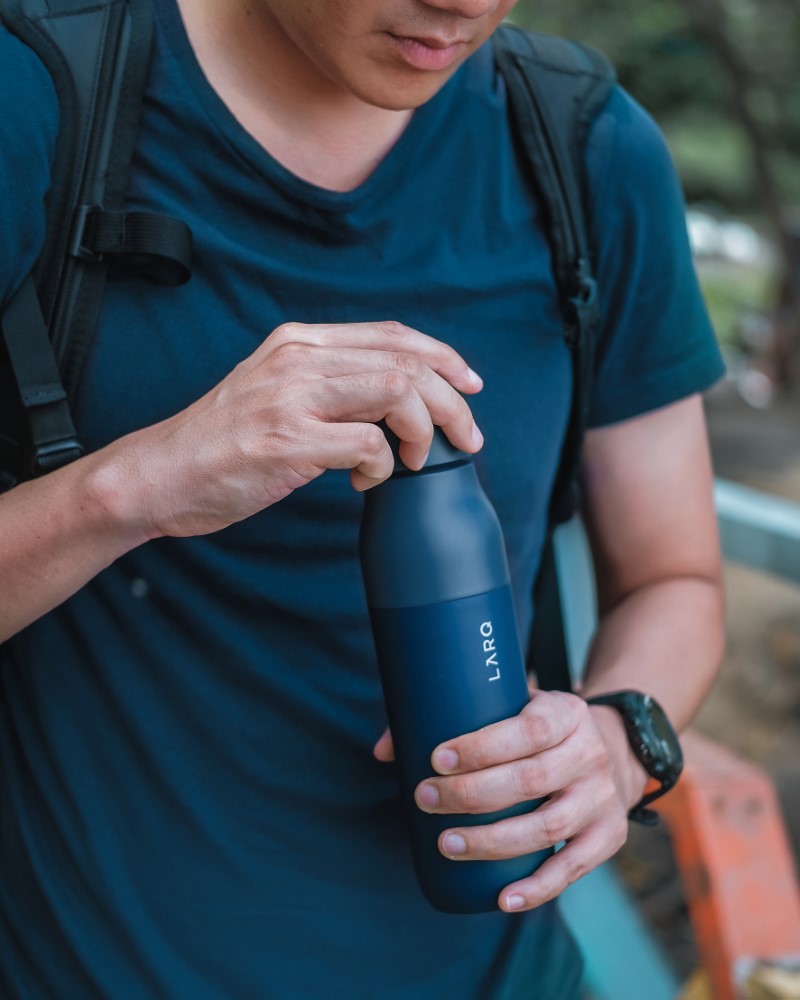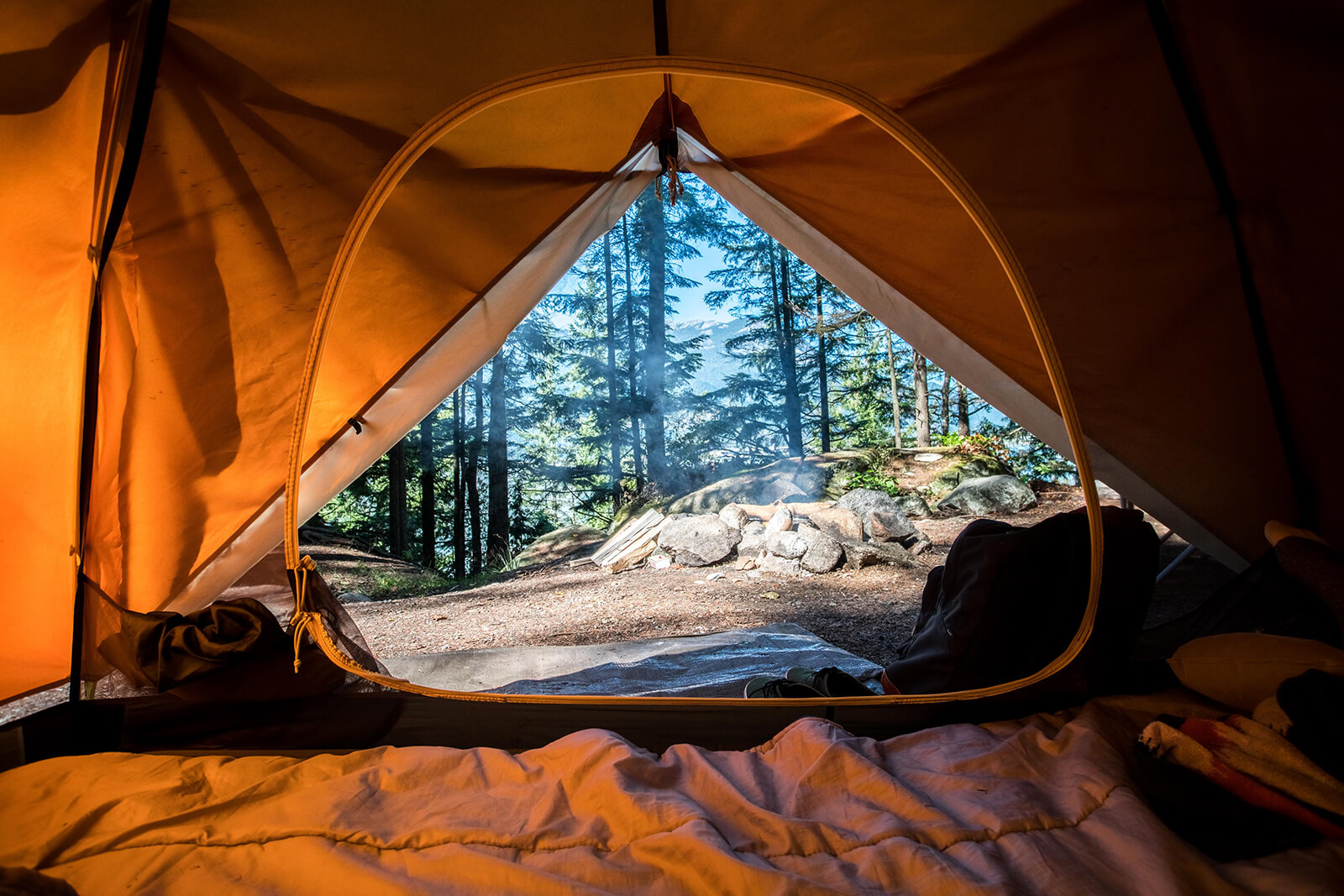Go zero waste (or try!)
Say no to single-use plastic and opt for reusable options where you can. Plastic will take up to 10,000 years to disintegrate, all the while leeching toxic chemicals into the Earth. When you’re roughing it out in the backcountry, it’s likely that you’ll need to fill up your bottle in questionable places. The perfect solution is to bring an activated charcoal stick with you that will filter the water and/or a self-cleaning bottle to deter any bacteria from forming in your water bottle; the LARQ Bottle uses medical grade UV-C LED technology to eliminate up to 99.9999% of bacteria and viruses (in Adventure Mode) so you can drink with confidence–even out in nature.
Organic food
Purchasing organic foods are more environmentally friendly than buying foods riddled with pesticides and chemicals. Aside from keeping those harmful chemicals from entering your body, you’re promoting sustainable agriculture and keeping any toxic food waste from entering your campsite. Organic farming reduces pollution, conserves water, reduces soil erosion, increases soil fertility, and uses less energy than traditional farming.
Dispose of human waste properly
When available, always use nearby restrooms, outhouses, or porta-potties. If you’re in a situation where you need to dig a hole, make sure you are at least 200 steps from any water source, dig a hole 6-8 inches deep and bury your waste. Make sure you pack up your used toilet paper, or better yet–use natural toilet paper.
Leave the campsite better than you found it
You should always leave a place better than you found it, but when camping, this is especially important. Respect the grounds we wander and pick up after yourself, or even for other people if needed. Litter, chemical products, and other manmade items, when left behind, are a danger for wildlife and the species that live in the area.
Make sure you pack everything with you–your trash, recyclables, and compost–and drop them off at the appropriate disposal area or take them with you.
Campfires
Always check the rules and regulations for campfires before you embark on your trip! Not all campsites will allow fires.
- Don’t bring your own firewood. Foreign species to the area can have adverse effects on the environment. Instead, use branches and sticks from surrounding areas of the campgrounds.
- Always use rocks from the surrounding area to form a barrier around your fire and build high to keep it contained
- Keep your fire small–this way, it’s much easier to control.
- Always be sure to burn all the wood and coal to ash so that the fire is completely diminished. Once you’ve done this, scatter the cold ashes around.
- Never leave a fire unattended. This is how accidents happen!
Lock everything up
The scent and taste of human food can make wildlife more aggressive, namely, bears. Bears are intelligent creatures that also have an incredible sense of smell. They can detect food from up to 20 miles away! Once they have a taste of human food, they’ll learn to seek it out, which becomes dangerous for campsites, humans, as well as the bears themselves.
Bear canisters are considered the safest form of storing food and trash aside from provided food lockers at some major campsites and backcountry because they are airtight and hide the scent of your food and other scented belongings. They’re also mandatory in some national parks and wilderness areas in the United States, so be sure to check the rules and regulations before taking on a trip!
Use eco-friendly products

Swapping for eco-friendly products–no matter how seemingly small the change–can have a huge impact on the environment…if you are using the right ones. However, beware of greenwashing. An easy way to check if a product is eco-friendly is scanning for certifications like Certified B Corporations, Fair Trade or Non-GMO. For disposable items, looking for biodegradable options is best–especially for camping. Here are a few of our recommendations for sustainably made or eco-friendly options for camping:
- Camp stove – Camp stoves are easy to use and convenient for cooking on an outdoor adventure.
- Bamboo travel utensils – Bamboo is one of the most sustainable crops because it grows fast and doesn’t require any fertilizer or pesticides. It regenerates its own roots so it doesn’t need to be replanted either. You’re probably thinking–so this is why I see bamboo products everywhere. Yes, yes it is.
- Self-cleaning Reusable Water bottle – Surely as a backpacker, you may be accustomed to using the Steripen–but did you know that these require you to carry a separate water bottle and are made with toxic mercury-based lamps? That means if you break yours in the backcountry, you would be releasing toxic chemicals into nature, and potentially exposing yourself to them too. Thus, it wouldn’t be a sustainable adventure without a LARQ Bottle that stays clean even in the roughest of adventures. Using UV-C LED technology, the LARQ Bottle purifies and cleans the inside of your bottle without the need for any toxic chemicals so it’s safe to use in and away from nature, and you can fill up and stay hydrated–even in the mountains. Just fill up, press the button twice for Adventure Mode, wipe the area around the mouth, and drink up!
- Activated Charcoal – You’ve probably heard the buzz around activated charcoal (especially in LA), and there’s good reason around it! For camping, activated charcoal sticks are great for filtering water without the plastic (like from popular water filters). Fill from your water source, drop an activated charcoal stick in, and leave overnight to let it work. You can refill your LARQ Bottle with this filtered water for your day hike!
- Dr. Bronner’s Biodegradable Soap – Soaps and lotions, although biodegradable can affect the quality of our natural water sources, so it’s still best to wash yourself at least 200 feet from any water source.
- Hammock – Hammocks are actually good for you to sleep in because of the position of your neck and spine when cradled in one of these bad boys. This one’s constructed with Repreve fabric which uses recycled plastic water bottles–9 to be exact!
- Hammock straps – When choosing a spot to string up your hammock, make sure the trees are strong (at least 8″ in diameter), healthy leaves, no bare patches on the bark, wilting or dead branches. Try to avoid young trees, trees that produce sap, or that tend to attract crawling poisonous vines. It’s also important to make sure your hammock straps are tree-friendly–meaning they won’t damage or strip the bark of the trees you’re using. If you come across a tree with stripping from a hammock strap, move onto the next one! That one probably needs a little break.
- Headlamps – Headlamps are pretty much essential when camping overnight or taking early morning hikes or late evening ones. These headlamps are made from 100% recyclable materials!
- Biodegradable wet wipes – Staying clean is the best way to prevent germs from spreading, but out in the backcountry this can be difficult without soap and water or wet wipes. Conventional wet wipes aren’t biodegradable and will need to be packed up in a bear canister after being used. Instead, biodegradable ones like these will take up to a month to decompose–just dig a 6-8inch hole at least 200 ft away from a water source.
Leave No Trace
As a general rule of thumb, pack up everything you brought with you when you leave your campsite. Follow these Seven Principles of Leave No Trace to have a wonderful and sustainable trip into the wilderness:
- Plan Ahead & Prepare – Knowing the terrain and environment you will be traveling through will help reduce environmental damage, minimize resource damage, and is overall safer.
- Travel & Camp on Durable Surfaces – as a rule of thumb, camp at least 200 feet from water sources and do try not to disturb, trample or camp on top of vegetation. It’s also best to camp further away from other campsites to ensure a clear route for wildlife to access water sources.
- Dispose of Waste Properly – Aside from properly disposing of human waste, other forms of waste include greywater (used water from washing dishes, showering, or doing laundry). Carry the water 200 feet away from any water sources and scatter strained dishwater.
- Leave What You Find – Grabbing a souvenir from the campsite doesn’t seem like it would be a big deal, but for the wildlife in the area, it could. Did you know that pregnant deer depend on maple leaves for vitamin C? Or that birds building nests would need that tiny stick you found? All you should take from your trip is the memories and the sights. Leave everything else to the inhabitants!
- Minimize Campfire Impacts – In addition to the aforementioned best practices for campfires, you should always try to use stoves if you can bring them with you instead of traditional fire for cooking. These are fast, easy to operate and have a less severe impact on the campsites and surrounding areas. If you have a site with a fire ring, use that! These are built to contain fires which mean less risk involved–especially if you’re a beginner!
- Respect Wildlife – This is their home and they don’t want to be disturbed. Be considerate guests and view them from afar, keeping food safely packed away and trash contained as well. As we mentioned before, you should set up camp far enough away from other campsites so that animals can pass through.
- Be Considerate of Other Visitors – We know you like your music, but keep it to yourself. Animals have an acute sense of hearing, so the music will cause a serious disturbance to the animals and others around you; if you must, use earbuds instead of loud speakers. When hiking, groups leading or riding pack stock have the right-of-way on trails, so as a hiker or bicyclist, move aside and let them pass–be quiet around horses since they startle easily.
Read more about the Seven Principles of Leave No Trace to ensure you’re best equipped with the knowledge to help you camp sustainably! Adventure away!
